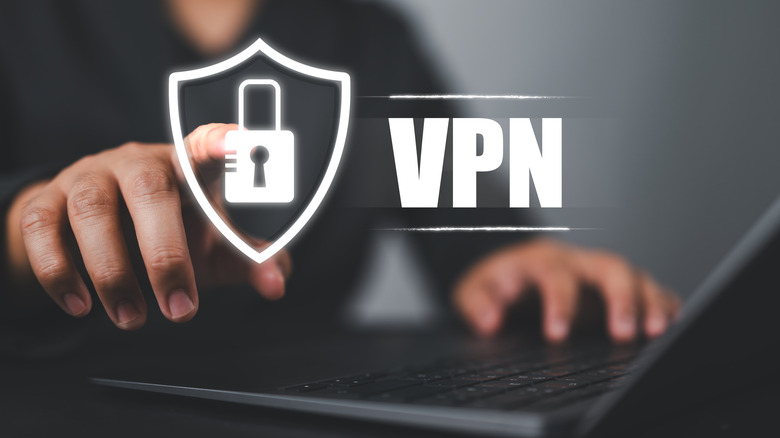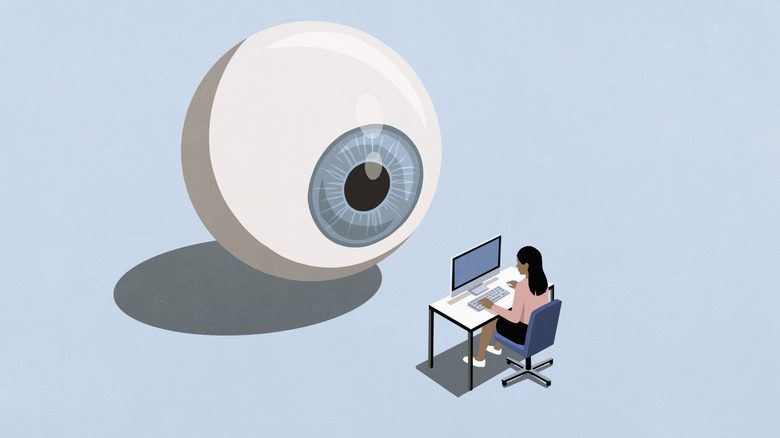What Would Happen If The US Banned VPNs?
Virtual Private Networks, or VPNs, are an excellent way to preserve your privacy and regain anonymity while browsing online. They work by masking your original IP and assigning you a temporary IP address on a physical server located remotely. But that may no longer be possible if recent legislation passes. On September 11, Michigan representatives introduced the Anticorruption of Public Morals Act which broadly bans online adult content, potentially including ASMR, adult manga, AI content, and also bans the use of VPNs totally, whether U.S. or foreign-developed. Michigan's bill would also charge internet service providers fines for not detecting and blocking VPN use — it also bans the sale of VPNs in the state. If the U.S. banned VPNs, it could spell disaster for a lot more than those privately using VPNs for their networks.
What's not really clear from the intended language is how this would affect corporate or security-related VPNs, especially when used for a remote workforce. Many companies use VPNs to protect and encrypt internet traffic for secure networking. While private VPNs, or those used by people at home, have been used to circumvent laws passed in other states, like Texas or Louisiana, enterprise-level VPNs are certainly not used that way and are integral to the operation of these companies. But VPNs aren't just used for nefarious activities or to bypass restrictions. People also use them to reduce data tracking, protect their IP address and identity, and bypass shady localized offers — like when travel companies charge more based on where you live. VPNs are prominent enough that the latest iPhone includes a useful VPN feature built in, called Private Relay.
What does the bill actually say?
The bill is intended to complement recent laws requiring age verification checks for mature content online, but goes a step further, preventing unintended access through what it describes as "circumvention tools." If you're located in a banned state, you could effectively use a VPN to change your virtual location and bypass restrictions, including age checks. According to the bill, "circumvention tools" are "any software, hardware, or service designed to bypass internet filtering mechanisms or content restrictions." It also defines the potential tools as "virtual private networks, proxy servers, and encrypted tunneling methods," which are expressly used to "evade content restrictions." It's broad and doesn't leave much outside of its purview, which allows a lot of room for manipulating the language.
Ultimately, there's no way to know how this will affect VPNs if legislation like this passes at a federal level. VPNs are also more difficult to detect from a technical standpoint than the language in this bill implies. Methods like deep packet inspection and blocking known IP addresses, which belong to popular VPNs, are a possibility. But that won't catch everything and expensive infrastructure development will be needed to effectively block VPNs as the bill is demanding, which has been pointed out by privacy advocates. There's also the point that, with your own private data, you don't have to delete your info from the internet or data brokers if you aren't creating any while protected behind a VPN. In that sense, VPNs protect everyone.
A VPN ban could be detrimental for online privacy
If the U.S. actually banned VPNs at a federal level, across all 50 states, the resulting scenario would likely be disastrous for many parties. Enterprise and corporate VPNs would not be allowed, unless there was an exception clause. Private VPNs, even those managed outside the country, would become illegal to use. ISPs or Internet Service Providers would then take over duties to detect, block, and report those using VPNs. However, because VPN detection is shoddy at best — some VPNs can hide that you're using them altogether — before technology is developed to discover and verify their use, it's possible for people to be flagged as using them, even when they are not. Law-abiding citizens could be caught in the net when those detection systems are wrong. Google currently uses AI to determine if users are teens; it's not a stretch to imagine its use for VPN verification, either.
Again, it's difficult to quantify the true impact of these potential scenarios. But if the bill passes in Michigan, or any other state, you may soon have the opportunity to see how it all plays out. The Michigan bill has not passed yet and has not been voted on by the Michigan Senate, but this is not the first time legislation like it has been proposed.


